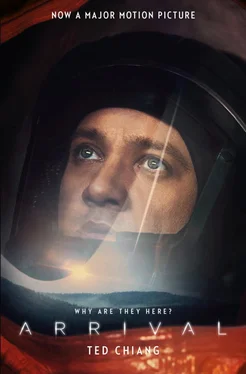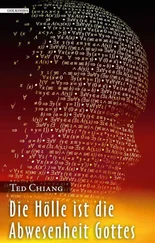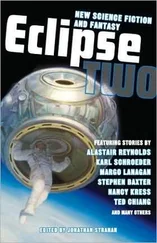I’ll keep reading. ‘Then Goldilocks tried the mama bear’s bowl of porridge, but it was full of spinach, which she also hated.’
You’ll put your hand on the page of the book to stop me. ‘You have to read it the right way!’
‘I’m reading just what it says here,’ I’ll say, all innocence.
‘No you’re not. That’s not how the story goes.’
‘Well if you already know how the story goes, why do you need me to read it to you?’
‘’Cause I wanna hear it!’
The air conditioning in Weber’s office almost compensated for having to talk to the man.
‘They’re willing to engage in a type of exchange,’ I explained, ‘but it’s not trade. We simply give them something, and they give us something in return. Neither party tells the other what they’re giving beforehand.’
Colonel Weber’s brow furrowed just slightly. ‘You mean they’re willing to exchange gifts?’
I knew what I had to say. ‘We shouldn’t think of it as “gift-giving”. We don’t know if this transaction has the same associations for the heptapods that gift-giving has for us.’
‘Can we –’ he searched for the right wording – ‘drop hints about the kind of gift we want?’
‘They don’t do that themselves for this type of transaction. I asked them if we could make a request, and they said we could, but it won’t make them tell us what they’re giving.’ I suddenly remembered that a morphological relative of ‘performative’ was ‘performance,’ which could describe the sensation of conversing when you knew what would be said: it was like performing in a play.
‘But would it make them more likely to give us what we asked for?’ Colonel Weber asked. He was perfectly oblivious of the script, yet his responses matched his assigned lines exactly.
‘No way of knowing,’ I said. ‘I doubt it, given that it’s not a custom they engage in.’
‘If we give our gift first, will the value of our gift influence the value of theirs?’ He was improvising, while I had carefully rehearsed for this one and only show.
‘No,’ I said. ‘As far as we can tell, the value of the exchanged items is irrelevant.’
‘If only my relatives felt that way,’ murmured Gary wryly.
I watched Colonel Weber turn to Gary. ‘Have you discovered anything new in the physics discussions?’ he asked, right on cue.
‘If you mean, any information new to mankind, no,’ said Gary. ‘The heptapods haven’t varied from the routine. If we demonstrate something to them, they’ll show us their formulation of it, but they won’t volunteer anything and they won’t answer our questions about what they know.’
An utterance that was spontaneous and communicative in the context of human discourse became a ritual recitation when viewed by the light of Heptapod B.
Weber scowled. ‘All right then, we’ll see how the State Department feels about this. Maybe we can arrange some kind of gift-giving ceremony.’
Like physical events, with their causal and teleological interpretations, every linguistic event had two possible interpretations: as a transmission of information and as the realization of a plan.
‘I think that’s a good idea, Colonel,’ I said.
It was an ambiguity invisible to most. A private joke; don’t ask me to explain it.
Even though I’m proficient with Heptapod B, I know I don’t experience reality the way a heptapod does. My mind was cast in the mold of human, sequential languages, and no amount of immersion in an alien language can completely reshape it. My worldview is an amalgam of human and heptapod.
Before I learned how to think in Heptapod B, my memories grew like a column of cigarette ash, laid down by the infinitesimal sliver of combustion that was my consciousness, marking the sequential present. After I learned Heptapod B, new memories fell into place like gigantic blocks, each one measuring years in duration, and though they didn’t arrive in order or land contiguously, they soon composed a period of five decades. It is the period during which I know Heptapod B well enough to think in it, starting during my interviews with Flapper and Raspberry and ending with my death.
Usually, Heptapod B affects just my memory: my consciousness crawls along as it did before, a glowing sliver crawling forward in time, the difference being that the ash of memory lies ahead as well as behind: there is no real combustion. But occasionally I have glimpses when Heptapod B truly reigns, and I experience past and future all at once; my consciousness becomes a half-century-long ember burning outside time. I perceive – during those glimpses – that entire epoch as a simultaneity. It’s a period encompassing the rest of my life, and the entirety of yours.
I wrote out the semagrams for ‘process create-endpoint inclusive-we,’ meaning ‘let’s start.’ Raspberry replied in the affirmative, and the slide shows began. The second display screen that the heptapods had provided began presenting a series of images, composed of semagrams and equations, while one of our video screens did the same.
This was the second ‘gift exchange’ I had been present for, the eighth one overall, and I knew it would be the last. The looking-glass tent was crowded with people; Burghart from Ft. Worth was here, as were Gary and a nuclear physicist, assorted biologists, anthropologists, military brass, and diplomats. Thankfully they had set up an air conditioner to cool the place off. We would review the tapes of the images later to figure out just what the heptapods’ ‘gift’ was. Our own ‘gift’ was a presentation on the Lascaux cave paintings.
We all crowded around the heptapods’ second screen, trying to glean some idea of the images’ content as they went by. ‘Preliminary assessments?’ asked Colonel Weber.
‘It’s not a return,’ said Burghart. In a previous exchange, the heptapods had given us information about ourselves that we had previously told them. This had infuriated the State Department, but we had no reason to think of it as an insult: it probably indicated that trade value really didn’t play a role in these exchanges. It didn’t exclude the possibility that the heptapods might yet offer us a space drive, or cold fusion, or some other wish-fulfilling miracle.
‘That looks like inorganic chemistry,’ said the nuclear physicist, pointing at an equation before the image was replaced.
Gary nodded. ‘It could be materials technology,’ he said.
‘Maybe we’re finally getting somewhere,’ said Colonel Weber.
‘I wanna see more animal pictures,’ I whispered, quietly so that only Gary could hear me, and pouted like a child. He smiled and poked me. Truthfully, I wished the heptapods had given another xenobiology lecture, as they had on two previous exchanges; judging from those, humans were more similar to the heptapods than any other species they’d ever encountered. Or another lecture on heptapod history; those had been filled with apparent non sequiturs, but were interesting nonetheless. I didn’t want the heptapods to give us new technology, because I didn’t want to see what our governments might do with it.
I watched Raspberry while the information was being exchanged, looking for any anomalous behavior. It stood barely moving as usual; I saw no indications of what would happen shortly.
After a minute, the heptapod’s screen went blank, and a minute after that, ours did too. Gary and most of the other scientists clustered around a tiny video screen that was replaying the heptapods’ presentation. I could hear them talk about the need to call in a solid-state physicist.
Читать дальше











